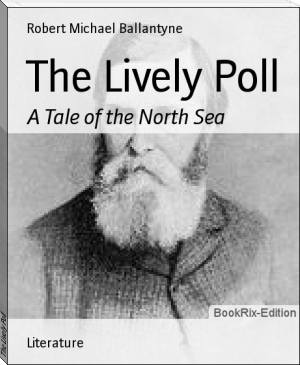The Lively Poll, Robert Michael Ballantyne [best novels to read to improve english txt] 📗

- Author: Robert Michael Ballantyne
Book online «The Lively Poll, Robert Michael Ballantyne [best novels to read to improve english txt] 📗». Author Robert Michael Ballantyne
Whatever influence might have resulted from the preaching and the prayer on that occasion, there could be no doubt whatever as to the singing. It was tremendous! The well-known powers of Wesleyan throats would have been lost in it. Saint Paul's Cathedral organ could not have drowned it. Many of the men had learned at least the tunes of the more popular of Sankey's hymns, first from the Admiral and a few like-minded men, then from each other. Now every man was furnished with an orange-coloured booklet. Some could read; some could not. It mattered little. Their hearts had been stirred by that young student, or rather by the student's God. Their voices, trained to battle with the tempest, formed a safety-valve to their feelings. "The Lifeboat" was, appropriately, the first hymn chosen. Manx Bradley led with a voice like a trumpet, for joy intensified his powers. Fred Martin broke forth with tremendous energy. It was catching. Even Groggy Fox was overcome. With eyes shut, mouth wide open, and book upside down, he absolutely howled his determination to "leave the poor old stranded wreck, and pull for the shore."
But skipper Fox was not the only man whose spirit was touched on that occasion. Many of the boats clung to the mission vessel till the day was nearly past, for their crews were loath to part. New joys, new hopes, new sensations had been aroused. Before leaving, Dick Martin took John Binning aside, and in a low but firm voice said--"you're right, sir. A grievous sin _does_ lie heavy on me. I robbed Mrs Mooney, a poor widdy, of her little bag o' savin's--twenty pounds it was."
The latter part of this confession was accidentally overheard by Bob Lumsden. He longed to hear more, but Bob had been taught somehow that eavesdropping is a mean and dishonourable thing. With manly determination, therefore, he left the spot, but immediately sought and found his little friend Pat Stiver, intent on relieving his feelings.
"What d'ee think, Pat?" he exclaimed, in a low whisper, but with indignation in his eye and tone.
"I ain't thinkin' at all," said Pat.
"Would you believe it, Pat?" continued Bob, "I've just heerd that scoun'rel Dick Martin say that it _was_ him as stole the money from Mrs Mooney--from the mother of our Eve!"
"You _don't_ say so!" exclaimed Pat, making his eyes remarkably wide and round.
"Yes, I does, an' I've long suspected him. Whether he was boastin' or not I can't tell, an' it do seem strange that he should boast of it to the young parson--leastwise, unless it was done to spite him. But now mark me, Pat Stiver, I'll bring that old sinner to his marrow-bones before long, and make him disgorge too, if he hain't spent it all. I give you leave to make an Irish stew o' my carcase if I don't. Ay, ay, sir!"
The concluding words of Bob Lumsden's speech were in reply to an order from Skipper Lockley to haul the boat alongside. In a few minutes more the mission ship was forsaken by her strange Sabbath congregation, and left with all the fleet around her floating quietly on the tranquil sea.
CHAPTER ELEVEN.
A CONSULTATION, A FEAST, AND A PLOT.
There was--probably still is--a coffee-tavern in Gorleston where, in a cleanly, cheerful room, a retired fisherman and his wife, of temperance principles, supplied people with those hot liquids which are said to cheer without inebriating.
Here, by appointment, two friends met to discuss matters of grave importance. One was Bob Lumsden, the other his friend and admirer Pat Stiver. Having asked for and obtained two large cups of coffee and two slices of buttered bread for some ridiculously small sum of money, they retired to the most distant corner of the room, and, turning their backs on the counter, began their discussion in low tones.
Being early in the day, the room had no occupants but themselves and the fisherman's wife, who busied herself in cleaning and arranging plates, cups, and saucers, etcetera, for expected visitors.
"Pat," said Bob, sipping his coffee with an appreciative air, "I've turned a total abstainer."
"W'ich means?" inquired Pat.
"That I don't drink nothin' at all," replied Bob.
"But you're a-drinkin' now!" said Pat.
"You know what I mean, you small willain; I drink nothin' with spirits in it."
"Well, I don't see what you gains by that, Bob, for I heerd Fred Martin say you was nat'rally `full o' spirit,' so abstainin' 'll make no difference."
"Pat," said Bob sternly, "if you don't clap a stopper on your tongue, I'll wollop you."
Pat became grave at once. "Well, d'ee know, Bob," he said, with an earnest look, "I do b'lieve you are right. You've always seemed to me as if you had a sort o' dissipated look, an' would go to the bad right off if you gave way to drink. Yes, you're right, an' to prove my regard for you I'll become a total abstainer too--but, nevertheless, I _can't_ leave off drinkin'."
"Can't leave off drinkin'!" echoed Bob.
Pat shook his head. "No--can't. 'Taint possible."
"Why, wot _do_ you mean?"
"Well, Bob, I mean that as I've never yet begun to drink, it ain't possible for me to leave it off, d'ee see, though I was to try ever so hard. Howsever, I'll become an abstainer all the same, just to keep company along wi' you."
Bob Lumsden gave a short laugh, and then, resuming his earnest air, said--
"Pat, I've found out that Dick Martin, the scoun'rel, has bin to Mrs Mooney's hut again, an' now I'm sartin sure it was him as stole the 'ooman's money--not because I heerd him say so to Mr Binning, but because Eve told me she saw him flattenin' his ugly nose against her window-pane last night, an' recognised him at once for the thief. Moreover, he opened the door an' looked into the room, but seein' that he had given Eve a terrible fright, he drew back smartly an' went away."
"The willain!" exclaimed Pat Stiver, snapping his teeth as if he wanted to bite, and doubling up his little fists. It was evident that Bob's news had taken away all his tendency to jest.
"Now it's plain to me," continued Bob, "that the willain means more mischief. P'r'aps he thinks the old 'ooman's got more blunt hid away in her chest, or in the cupboard. Anyhow, he's likely to frighten poor Eve out of her wits, so it's my business to stop his little game. The question is, how is it to be done. D'ee think it would be of any use to commoonicate wi' the police?"
The shaking of Pat Stiver's head was a most emphatic answer.
"No," said he, "wotiver you do, have nothin' to do wi' the p'leece. They're a low-minded, pig-headed set, wi' their `move on's,' an' their `now then, little un's;' an' their grabbin's of your collars, without no regard to w'ether they're clean or not, an' their--"
"Let alone the police, Pat," interrupted his friend, "but let's have your adwice about what should be done."
After a moment's consideration, the small boy advised that Mrs Mooney's hut should be watched.
"In course," he said, "Dick Martin ain't such a fool as to go an' steal doorin' the daytime, so we don't need to begin till near dark. You are big an' strong enough now, Bob, to go at a man like Dick an' floor him wi a thumpin' stick."
"Scarcely," returned Bob, with a gratified yet dubious shake of his head. "I'm game to try, but it won't do to risk gettin' the worst of it in a thing o' this sort."
"Well, but if I'm there with another thumpin' stick to back you up," said Pat, "you'll have no difficulty wotsumdever. An' then, if we should need help, ain't the `Blue Boar' handy, an' there's always a lot o' hands there ready for a spree at short notice? Now, my adwice is that we go right off an' buy two thumpin' sticks--yaller ones, wi' big heads like Jack the Giant Killer--get 'em for sixpence apiece. A heavy expense, no doubt, but worth goin' in for, for the sake of Eve Mooney. And when, in the words o' the old song, the shades of evenin' is closin' o'er us, we'll surround the house of Eve, and `wait till the brute rolls by!'"
"You're far too poetical, Pat, for a practical man, said his friend. Howsomediver, I think, on the whole, your adwice is not bad, so well try it on. But wot are we to do till the shades of evenin' comes on?"
"Amoose ourselves," answered Pat promptly.
"H'm! might do worse," returned his friend. "I s'pose you know I've got to be at Widow Martin's to take tea wi' Fred an' his bride on their return from their weddin' trip. I wonder if I might take you with me, Pat. You're small, an' I suppose you don't eat much."
"Oh, don't I, though?" exclaimed Pat.
"Well, no matter. It would be very jolly. We'd have a good blow-out, you know; sit there comfortably together till it began to git dark, and then start off to--to--"
"Go in an' win," suggested the little one.
Having thus discussed their plans and finished their coffee, the two chivalrous lads went off to Yarmouth and purchased two of the most formidable cudgels they could find, of the true Jack-the-Giant-Killer type, with which they retired to the Denes to "amoose" themselves.
Evening found them hungry and hearty at the tea-table of Mrs Martin-- and really, for the table of a fisherman's widow, it was spread with a very sumptuous repast; for it was a great day in the history of the Martin family. No fewer than three Mrs Martins were seated round it. There was old Granny Martin, who consented to quit her attic window on that occasion and take the head of the table, though she did so with a little sigh, and a soft remark that, "It would be sad if he were to come when she was not watching." Then there was widow Martin, Fred's mother--whose bad leg, by the way, had been quite cured by her legacy.
And lastly, there was pretty Mrs Isa Martin, Fred's newly-married wife.
Besides these there were skipper Lockley of the _Lively Poll_, and his wife Martha--for it will be remembered Martha was cousin to Isa, and Stephen's smack chanced to be in port at this time as well as the _Sunbeam_ and the _Fairy_, alias the _Ironclad_, which last circumstance accounts for Dick Martin being also on shore. But Dick was not invited to this family gathering, for the good reason that he had not shown face since landing, and no one seemed to grieve over his absence, with the exception of poor old granny, whose love for her "wandering boy" was as strong and unwavering as was her love to the husband, for whose coming she had watched so long.
Bob Lumsden, it may be remarked, was one of the guests, because Lockley was fond of





Comments (0)